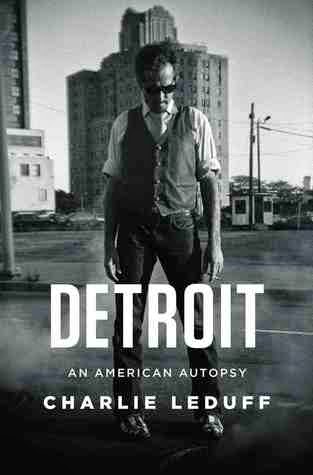Review: Detroit: An American Autopsy by Charlie LeDuff
Speramus Meliora: Resurget Cineribus
 |
| Goodreads |
I absolutely adore the cities of Cleveland, Pittsburgh, and Detroit, but I've been away from the area for over a decade, so I take any opportunity I can to find out what's going on "back home" in these three cities in particular. Cleveland and Pittsburgh seem to be doing well, the latter with a booming healthcare research industry, and the former with a wealth of cultural events and world-renowned attractions. Detroit, on the other hand, hasn't done as well in the past decade, with a mass exodus of its citizens leaving behind thousands of empty buildings, the city declaring bankruptcy, and local governments seemingly unable to govern without being rocked by scandal.
Hoping to gain some understanding about what's happening in Detroit, I picked up Charlie LeDuff's book, and in spite of having started one book already, and having another two I needed to read, I couldn't put it down. So come with me through the jump as I tell you what had me so captivated by this book.
 |
| It really is a beautiful city! |
 | ||
| "The man took his factory away, but he didn't take the people with him" |
Detroit still has about 700,000 people--people who live and work and struggle to make a life in a place that so many have abandoned. But it's hard to abandon a place that holds your roots, your family, your heart. The disintegration of this most American of cities cannot be blamed on the residents who call Detroit home, who want nothing more than to see their home become a place where truly living, not just surviving, is possible again. The story of one of Charlie's firefighter friends is indicative of your average Detroiter:
His father was born a few blocks from the firehouse and retired after serving nearly thirty years in the department. And now Nevin was working here too, trying like all the brothers in the firehouse to keep the remnants and its people from burning to the ground. "I love this place, this neighborhood, these people," he said. "I'm angry with the people in power who are supposed to lead and don't."
 |
| The abandoned Packard Plant |
People often ask, where is the hope in Detroit? It was right here. I had just watched it. Society had functioned properly in this case because we all wanted it to. {snip} We got justice without harming the law. It felt righteous. In the end, if we are going to fix it, we are going to have to stand up and say "enough" and then get on with the difficult work of cleaning it up.
Wench Rating:






Comments
Post a Comment